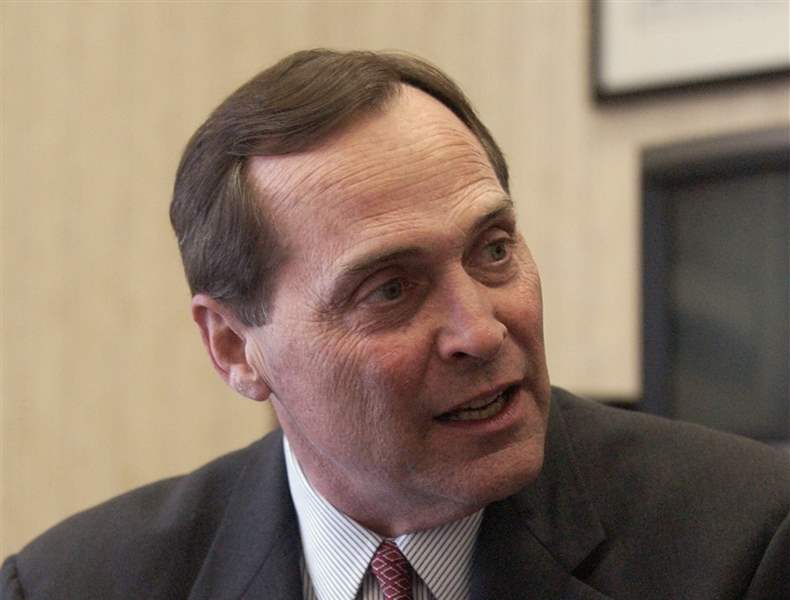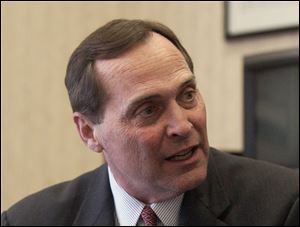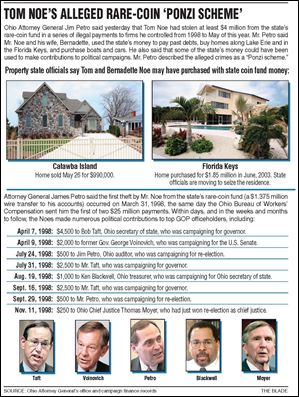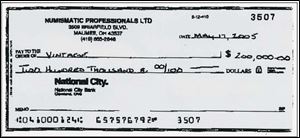
STATE OF TURMOIL
Petro: Noe stole millions
7/22/2005
Ohio Attorney General Jim Petro
Morrison (The Blade)
Buy This Image

Ohio Attorney General Jim Petro
COLUMBUS -- Tom Noe stole millions of dollars from the state and used a "Ponzi" scheme to fabricate profits within the state's $50 million rare-coin investment, Ohio's attorney general said yesterday.
"There was an absolute theft of funds going on," Attorney General Jim Petro said.
Mr. Petro said there is evidence that Mr. Noe pocketed nearly $4 million in money invested with the coin fund through the Ohio Bureau of Workers Compensation since 1998.
Mr. Petro asked a judge to further restrict the former Toledo-area coin dealer from selling personal assets because he believes they may have been purchased with state money.
State officials yesterday laid out a complicated scheme of payments between companies Mr. Noe controlled, which they say resulted in the theft of state money.
The attorney general said the theft began on March 31, 1998, the day Mr. Noe received the first of two $25 million payments from the workers compensation bureau, and continued until late May more than eight weeks after The Blade first reported on April 3 that there were problems with the state's investment.
"On Day One, Tom Noe took $1.375 million and put it in his personal or his business account," Mr. Petro said. Records show that Mr. Noe immediately began using the state's money for his personal use, the attorney general said.
A week later, Mr. Noe and his wife, Bernadette, made $4,500 in contributions to then-Secretary of State Bob Taft's campaign for governor.
In the three months after the $1.375 million transfer of state funds, Mr. Noe made thousands of dollars in political contributions, including an additional $2,500 to Mr. Taft, $2,000 to then-Gov. George Voinovich's Senate campaign, and $500 to Mr. Petro's campaign for re-election to the state auditor post he held before becoming attorney general.
When asked if he believed the state's money had been used for campaign contributions, Mr. Petro said: I don t see that. I mean, clearly, Tom Noe personally contributed to campaigns and the source of his funds could very well be public money.
But Mr. Petro connected the dots on Mr. Noe's personal purchases, saying the Noes used public money to acquire millions of dollars worth of homes, cars, and boats.
Mr. Noe's attorneys acknowledged on May 26 that up to $13 million in state assets is missing from the coin funds, but they have not shed any light into what happened to the state's money.
Mr. Noe did not return telephone calls yesterday, and Judson Scheaf, a Columbus attorney who is representing him, declined to respond to Mr. Petro's claims that Mr. Noe illegally converted nearly $4 million in state money, except to say: Mr. Petro will have to prove his case in court.
Mr. Noe, who has contributed more than $200,000 to political candidates, parties, and committees, is facing multiple federal and state investigations, including a probe into whether he illegally funneled money into President Bush's re-election campaign last year.
A U.S. attorney and a county prosecutor said yesterday they are pursuing their criminal probe of Mr. Noe.
Lucas County Prosecutor Julia Bates, a member of the federal-state task force investigating Mr. Noe, said investigators still don t know what happened to the state's money.
It's such a spider's web, Ms. Bates said.
'Pattern of corruption'
Mr. Petro said yesterday that he had amended the state's civil filing against Mr. Noe to include charges of negligence, unjust enrichment, and breach of contract for his conduct while managing the state's rare-coin funds for seven years.
The attorney general said he expects Mr. Noe to attend an Aug. 30 deposition, when he would have to answer questions under oath.
The news conference occurred the same day The Blade reported about a flurry of activity in the coin funds in the days and weeks before May 24, the day the state froze coin-fund assets and two days before Mr. Noe's attorneys said up to $13 million of the state's money is missing.
On May 27, Judge David Cain of Franklin County Common Pleas Court ordered Mr. Noe and his wife to obtain the court or the state's approval before selling assets above $15,000. Mr. Petro is asking that limit be lowered to $5,000 in light of the new accusations against Mr. Noe.
"It's something that needs quick attention," said Judge Cain, who scheduled a hearing for 9 a.m. Monday to hear Mr. Petro's requests.
House Minority Leader Chris Redfern (D., Catawba Island) said Mr. Petro waited too long after The Blade's April 3 story about the state's rare-coin investment with Mr. Noe.

Had the attorney general actually started to take action on April 4 after reading the first article rather than initially pooh-poohing any thought that Tom Noe could be a crook we could have secured what already had been sold, and that includes a $1 million house in the same township where I live, Mr. Redfern said.
Mr. Petro said there's more bad news to come about the state's rare-coin investment.
"We think that as we go through ... more and more of the transaction records, March 31, 1998, until May 24, I think we're going to find more instances where assets could have been converted or abused in one way or another," Mr. Petro said.
"There is a pattern of corruption, and the profits reported by Mr. Noe were fictitious," the attorney general said. He said the coin funds never turned any profit for the state.
Mr. Petro said Mr. Noe's operation had the markings of a "Ponzi" scheme, the moniker for an old scam that takes place when someone brings in investment dollars and you pay the investment dollars out as supposed earnings, when in fact to get that money you bring in more investment dollars.
'You know, named after that famous scam artist, a guy named Ponzi," he said. "Yes, I think it's a Ponzi scheme."
'Flipping' coins
Transaction records, Mr. Petro said, show money being paid to Mr. Noe's personal accounts but not being documented in coin-fund records. However, Mr. Petro said no satisfactory audit has been conducted on the state's coin funds throughout their seven-year history.
As part of its motions filed yesterday, the state said Thomas Noe Inc. "engaged knowingly and allowed others to engage in unlawful 'flipping' of coins resulting in inflated, false, and illusory profits to the funds. Noe Inc. allowed others to engage in conduct detrimental to the financial well being of the fund."
Mr. Noe's attorney, Mr. Scheaf, said it was unnecessary for Mr. Petro to file a motion to add three counts to the lawsuit the state filed against Mr. Noe in Franklin County.
"There is nothing new in the allegation of conversion," Mr. Scheaf said. "Mr. Petro has no judgment against Mr. Noe. He has no business conducting discovery or seeking information about Mr. Noe's private information."
In March, 1998, several days before the bureau invested $25 million with Mr. Noe's Capital Coin Fund, Mr. Noe's account at National City Bank was running a negative balance and had previously bounced 40 checks, Leonard Palaibis, a forensic accountant for the attorney general's office, wrote in a sworn affidavit.
On March 31, 1998, the same day the bureau transferred $25 million to Capital Coin, $1.375 million was wired from Capital Coin Fund's account at National City Bank to Mr. Noe's Vintage Coins and
Collectibles account at National City Bank, the forensic accountant wrote.
Also on that day, Mr. Noe made a principal payment of $396,470 from the Vintage Coin account to pay off a commercial loan most of it incurred by Vintage before Jan. 1, 1998, the affidavit said.
Mr. Noe, through his companies, paid himself and the bureau with money he reported as "profits," William Becker, Mr. Petro's lead trial counsel, wrote.
From March, 1998, through May, 2005, Capital Coin Funds I and II paid Mr. Noe's company, Vintage Coins and Collectibles, $2.16 million in profits over a series of 17 separate transactions, Mr. Becker said.
In his affidavit, Mr. Palaibis stated that a review of Capital Coin Funds ledgers showed $7.9 million in "earned alleged profit" for the BWC.
The claims filed yesterday state that on May 16, 2005, Mr. Noe liquidated coin-fund stocks being held in Charles Schwab accounts totaling $400,000 and transferred the money into his Vintage Coin and Collectibles account. The last alleged "profit distribution" to Vintage occurred on May 17, in the amount of $200,000, Mr. Palaibis wrote.
Mr. Becker wrote that Mr. Noe's attorney "confessed" May 26 that $10 million to $12 million was "unaccounted for."
"With this confession, it is becoming clear that these Coin funds had never been profitable and that by paying himself a profit, Mr. Noe was converting BWC funds to his personal use," Mr. Becker wrote.
Mr. Becker wrote that despite pocketing nearly $2 million, Mr. and Mrs. Noe "have not put aside a single penny in restitution for the $10 million to $12 million shortfall in the Coin Funds;" funds to benefit the injured workers of Ohio.
But there is concern that the money went elsewhere.

Attorney General Jim Petro alleges the last theft by Tom Noe from the rare-coin fund was for $400,000 on May 17 in the form of two checks for $200,000 each. State record show one of the checks, above, from a subsidiary of the coin fund, Numismatic Professionals LTD., was made out to 'Vintage,' which refers to Vintage Coins & Collectibles. That was Mr. Noe's former coin business in Monclova Township. The check was not signed, but it was deposited into a Vintage account, records show.
Real estate deals
Flush with cash from the coin funds, the Noes dabbled in high-end real estate. In addition to purchasing vacation homes in the Florida Keys and on Catawba Island, the couple built a home in suburban Toledo.
In March, 1999, Mrs. Noe bought a half-acre lot in Maumee worth $86,000 and constructed a five-bedroom home that she sold for $723,000 almost five years later. In nearby Sylvania, Mr. Noe bought, built, and sold a house between 2001 and 2002. The four-bedroom house fetched $529,000, according to Lucas County property records.
Those houses seem modest compared to the Noes's vacation retreats.
After unloading the Sylvania house, they paid $270,000 to Mr. Noe's father-in-law, Francis Restivo, a retired Lucas County Court of Common Pleas judge, for a lot on Catawba Island. They built a 4,259-square-foot home on the lot in 2003, which they sold this May for $990,00 after the coin fund's problems were uncovered.
The couple's most valuable house is in the Florida Keys, where Mr. Noe currently is secluded. In June, 2003, he sold the Sunshine State home bought two years earlier for $1.295 million, doubling his money.
They replaced it with a $1.85 million multi-storied home with an ocean view.
Among the Noes assets listed in the state's civil suit are:
- The Catawba Island home, purchased in 2002, which was sold on May 26 for $990,000.
- A boat, purchased in 2003, which recently was sold for $55,000.
- The Maumee condo, purchased last year, which was sold on June 28 for $550,000.
"[Coin fund] money has been used to acquire personal investments, whether it's a Florida home, a Catawba Island home, or a Maumee, Ohio, home, or vehicles, or boats," Mr. Petro said yesterday. "All of those assets have been acquired by Tom Noe. And they've been acquired with public money."
Mr. Petro also said yesterday that there will be some measure of suspicion about other state officials and their role in Mr. Noe's investment, refusing to rule out the possibility that bureau employees and members of the governor's staff could be investigated.
Former members of the governor's staff have acknowledged receiving loans from Mr. Noe, attending lavish dinners that he hosted, and vacationing at his Florida home.
Jeremy Jackson, spokesman for the bureau, said the bureau officials who approved the rare-coin investments are no longer with the bureau. Questions about how the funds could have gone so awry need to be addressed by them, he said.
"It's clear it was a mistake. It's clear additional controls are necessary," he said. "It's certainly easy to say, looking back, more should have been done. Looking back, the investment wasn t a prudent one."
An eye on assets
If Mr. Petro were conducting the criminal investigation into Mr. Noe's behavior, he said the appropriate charge lodged against the former Toledo-area coin dealer would be theft. Mr. Petro, however, is representing the state's interest only in civil matters.
Gregory White, the U.S. attorney for the northern district of Ohio, who is investigating Mr. Noe for alleged criminal wrongdoing said yesterday that he could not say if criminal charges were "imminent."
"I am one of four prosecutors involved in the criminal investigation," Mr. White said, adding that he had consulted with Mr. Petro about placing more restrictions on the Noes assets. "We are coordinating with all of the other agencies and departments to make sure there isn't confusion that might impact one of our functions. We will follow the leads wherever they go."
On April 27, Mr. White confirmed the federal investigation of Mr. Noe for possible violations of campaign contribution laws. On May 31, federal and state prosecutors agreed to form a task force to oversee the investigation of the state's rare-coin investment that Mr. Noe controlled and to pursue criminal charges.
Lucas County Prosecutor Bates said Mr. Petro had made the right decision to ask the Franklin County court to require the Noes to receive court permission to sell personal property valued above $5,000.
The current limit is $15,000.
Ms. Bates said Mr. Noe has at least four attorneys, and Mrs. Noe also has at least four attorneys.
"We need to tie up those assets," Ms. Bates said. "Until we can unravel what is his money and what is the state's money, the money is flowing."
Ms. Bates said Mr. Noe is entitled to legal representation, but she expressed concern that state funds were being used to pay legal fees.
She said it was unclear what happened to the money that Mr. Noe allegedly converted for his own use.
Although Mr. Petro has scheduled an Aug. 30 deposition of Mr. Noe, Ms. Bates said the civil case could be put on the back burner until the federal investigation is completed because of Mr. Noe's Fifth Amendment rights.
Franklin County Prosecutor Ron O' Brien said Mr. Petro's work is aiding investigators.
Mr. O' Brien said the task force of federal and state investigators is shooting for Labor Day weekend to have something to evaluate.
Asked why Mr. Noe has not been arrested, Mr. O Brien replied: "There is a whole big package and once presented, it will be the basis of legal action."
Mr. O' Brien said he is not worried about Mr. Noe leaving the country.
"We know where he is and he and his lawyers have responded to any request for information or contact," said Mr. O Brien, who declined to comment whether he has interviewed Mr. Noe.
A political issue
In an April 7 interview with The Blade, Governor Taft vehemently defended Mr. Noe and the state's rare-coin investment: "He's probably been the most effective advocate for this part of the state in Columbus that you've got and you're going after this guy. You're trying to kill him for some reason."
After yesterday's news, Mark Rickel, a spokesman for the governor said: "When evidence of Noe's mishandling of state money first began to surface, the governor acted to dissolve Noe's investment with the bureau and to expedite the inventory of his assets."
He added, "The governor commends the attorney general's continued vigorous pursuit of all assets that belong to the state."
Democrats, though, have accused Republican officeholders who benefited from Mr. Noe's windfall in the form of campaign contributions from protecting their friend and ally for nearly two months, allowing him time to move money and coins within the investment.
Columbus Mayor Michael Coleman, who is seeking the Democratic Party's nomination for governor, distributed a copy of an April 5 letter he sent to Mr. Petro asking him to embrace his proposal for an independent investigation of Mr. Noe and the bureau.
Mr. Coleman said Mr. Petro ignored that request.
"Instead of aggressively pursuing the matter, Petro remained silent," said Mr. Coleman, in a written statement. "Later that month, The Blade revealed that Petro and Auditor Betty Montgomery joined Noe in financing a campaign television ad on behalf of a Lucas County Republican Party county commission candidate."
The Blade reported June 20 that Mr. Noe loaned the Lucas County Republican Party's candidates fund $40,000 on Oct. 22, 2002 the day before the fund paid the same amount to a Columbus firm that bought a series of television ads for Maggie Thurber on Toledo stations.
The same day Mr. Noe made his loan, Mr. Petro contributed $10,000 to the candidates fund. Ms. Montgomery's campaign contributed $26,000 of in-kind services to Ms. Thurber's campaign.
"It was clear that not only was Petro a recipient of campaign donations from Noe, they were also political allies," said Mr. Coleman. "No wonder Petro had no stomach to investigate wrongdoing by Noe."
Jason Mauk, a spokesman for the Ohio Republican Party, said it is unfortunate Democrats continue to politicize this issue while Republicans are providing the leadership necessary to address it.
"Attorney General Petro is providing outstanding leadership in getting to the bottom of these concerns as quickly as possible and we are extremely satisfied by the progress that is being made by all of our Republican elected officials," Mr. Mauk said.
Staff writers Christopher D. Kirkpatrick, Joshua Boak, and Mike Wilkinson contributed to this report.
Contact James Drew at:
jdrew@theblade.com
or 614-221-0496.